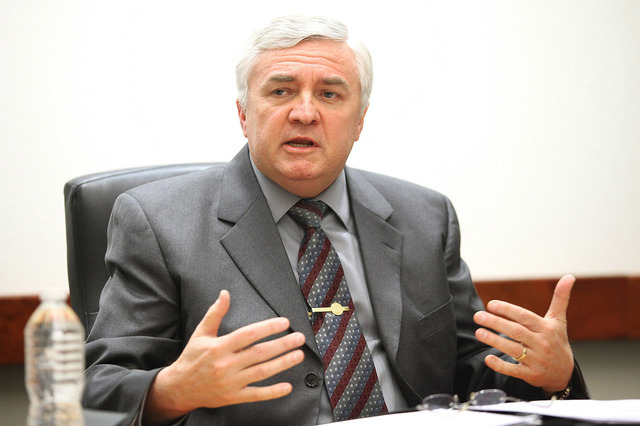No sandbagging allowed!
The Nevada Supreme Court should not permit a sore election loser such as Henderson’s Rick Workman to sandbag a duly elected official a year after the election, especially when he knew he could have brought a challenge earlier.
That’s the main thrust of a brief (posted below) filed by Henderson Mayor Andy Hafen’s attorney, Todd Bice, to a case in which Workman is seeking to remove Hafen from office, claiming he wasn’t eligible to be elected to his current term. The Nevada Supreme Court will consider the case, after Workman’s attorney, Stephanie Rice, has a chance to reply.
Rice is the lawyer who successfully argued the case of Lorton v. Jones, which held earlier this year that members of certain city councils — whether serving as a member of the council or serving as mayor — were limited to 12 years total, not up to 12 years as a council member and another 12 years as mayor. As a result, some term-limited members of Reno’s City Council were barred from running for mayor.
Workman later engaged Rice to challenge Hafen, who had reached his 12-year limit before running for and winning the Henderson mayoral primary last year. His action asks the Nevada Supreme Court to either allow him to challenge Hafen directly, in a proceeding known as quo warranto, or to force the attorney general to do so.
But Bice says Workman is out of luck, for several reasons. Among them:
• He doesn’t have standing. Workman came in second in the primary election, so far behind Hafen that no runoff was necessary. But, unlike the Miss America pageant, coming in second doesn’t give you the right to inherit the crown, even if the winner is ineligible for the office. Citing a 1959 case, Bice reminds that “This court explained that a rejected candidate cannot have an entitlement to the office because doing so would have the effect of ‘disappointing the popular will, and electing to office a man whose pretensions the people have designed to reject. Indeed, any other rule would be “repugnant to the principle of majority rule, which is the cornerstone of orderly government.”’”
And, without standing, Workman can’t sue Hafen.
• He waited too long. Workman implies in his original filing that he suspected — long before Lorton v. Jones was decided — that Hafen was ineligible because he’d served so long in local government. But he failed to bring a challenge before the election or even after voting was over but before the election was certified, because he lacked the resources.
“In claiming that he had a meritorious challenging to Mayor Hafen’s eligibility before the election — because he claims Lorton does not create a new rule — Workman defeats his own claim. Accepting Workman’s spin as true, the law required him to raise his challenge before voters went to the polls,” Bice writes, adding, “Courts must be leery of entertaining such post-election claims, because it encourages sandbagging on the part of sore losers.”
• He can’t make the attorney general do stuff. Since Workman can’t sue himself, he also asks the court to force the attorney general to sue to remove Hafen, by issuing a writ of mandamus. But Bice argues the attorney general can’t be forced to act in cases that allow her discretion (and here, Attorney General Catherine Cortez Masto has declined to sue).
“But contrary to Workman’s belief, mandamus is not an available remedy to direct a government official to enforce laws in a fashion that a self-interested citizen prefers,” Bice writes. And don’t take his word for it: He cites the 1911 case of Thrash v. Lamb as proof. “It has been held, for instance, that mandamus will not issue to control the discretion of the attorney general as to whether or not he [or she] should institute quo warranto proceedings,” the case reads.
• And besides, the attorney general made the right call. In deciding not to sue Hafen, the attorney general’s office said the Lorton case established a new rule of law, and that it was meant to apply going forward. To unseat Hafen now, a year after the election, would disenfranchise the voters who cast ballots for Hafen and against Workman.
That’s a perfectly defensible argument, Bice writes, not an abuse of discretion that could be addressed with a writ of mandamus, assuming one was even appropriate here. “Exposing his lack of substance, Workman does not dare assert – let alone present proof – that the attorney general’s refusal to advance his sour-grapes agenda is based on prejudice or preference,” Bice writes. “It is hardly arbitrary and capricious for the attorney general – the state’s principal law enforcement official – to preserve the integrity of elections and votes that citizens have lawfully cast.”
Rice has 15 days to file her reply. After that, it’s up to the court as to whether Workman will be able to proceed against Hafen, or whether the mayor will be able to complete his current – and apparently final – term in office.





















